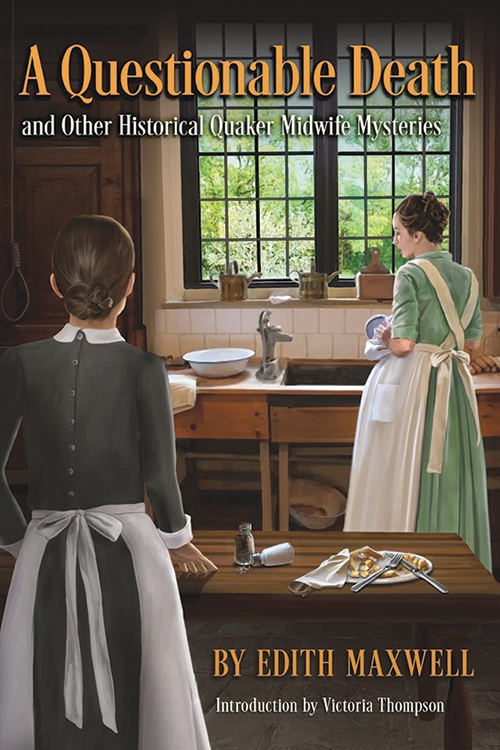
A Questionable Death and Other Historical Quaker Midwife Mysteries
Reviewed by Kathleen Jenkins
October 1, 2023
By Edith Maxwell. Crippen and Landru Publishers, 2023. 172 pages. $20/paperback; $8.99/eBook.
Historical fiction combined with a cozy mystery style and involving Quaker characters is the basis of this collection of short stories by Edith Maxwell, the Quaker author. (For those unfamiliar with the subgenres of crime fiction, a cozy mystery is a story in which sex and violence occur off stage, the detective is an amateur sleuth, and the crime and detection take place in a small, socially intimate community.) Maxwell has written seven full-length mysteries in the Quaker Midwife Mysteries series, and I had been waiting a while for the latest book to arrive. A Questionable Death and Other Historical Quaker Midwife Mysteries is the last in the series and includes ten short stories, some of which have been previously published.
Broadly speaking, the setting of the majority of the stories is the late-nineteenth-century village of Amesbury, Mass. Rose Carroll, the midwife, is the main character whose role is to help women in her small town usher new lives into the world. Occasionally, as she is often involved in life at its rawest, she is called to give input on perplexing situations and solve mysteries about murders or other crimes. There is a cast of repeat characters from book to book, and they show up in the stories in this book too. A fictionalized version of Quaker poet John Greenleaf Whittier appears often as a character in the series; he shows up in this book’s first story, requesting Rose’s help with solving a homicide.
Unlike the rest of the series, the stories in this book aren’t all from Rose’s point of view. One of the stories is from the vantage point of Rose’s niece, and the story eventually changed main characters and became the first book in the series.
A brief introduction leads each of the ten stories, providing either some background on the story’s inspiration or details about its original publication. This information is interesting, although it does lead to less immersion into the fictional world. I was very excited to receive the book and dived right into it, reading story after story. Looking back, I think reading the stories more slowly and taking time to absorb each one would have been better.
As a convinced Friend living in Texas, I appreciated how these stories whose characters use plain speech and have time-accurate details of the houses, clothes, and ways of life gave me the opportunity to imagine living in a small Massachusetts village. I also wondered what it would be like to have my faith be so present that it changes the pronouns and the titles I use (or don’t use) when speaking with others. Seeing sentiments similar to my own in print, such as “Edna wasn’t a Quaker like we were, but she embodied our values of integrity and equality,” filled a need that I didn’t know I had.
I completely recommend this book by Edith Maxwell to all readers who enjoy cozy mysteries or historical fiction. It is a fun read and a nice escape into another time. For Quaker Midwife fans wanting more, the publisher offers a special clothbound signed and numbered edition with an additional story. Readers may wish to look for Maxwell’s other books as well; she has several series under both her name and her pen name, Maddie Day.
Kathleen Jenkins is the book review editor for Friends Journal and an environmental engineer. She is a member of Live Oak (Tex.) Meeting and was formerly a member of Orange County (Calif.) Meeting.



Comments on Friendsjournal.org may be used in the Forum of the print magazine and may be edited for length and clarity.